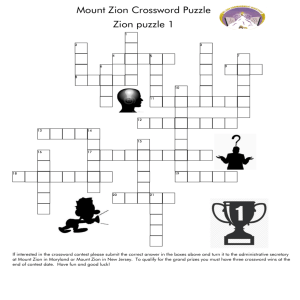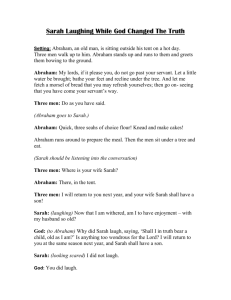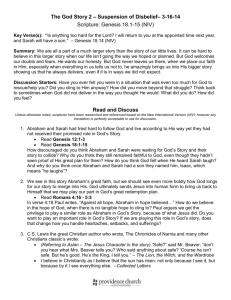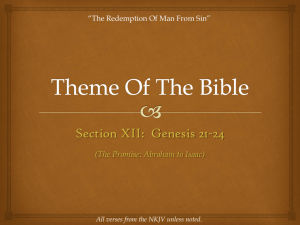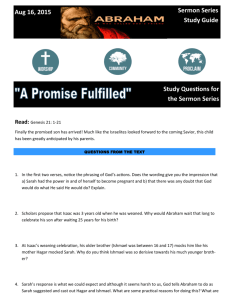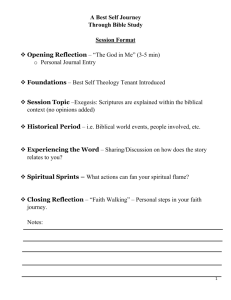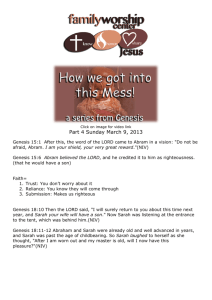5. Chayei-Sarah - Qodeshministries.co.za
advertisement
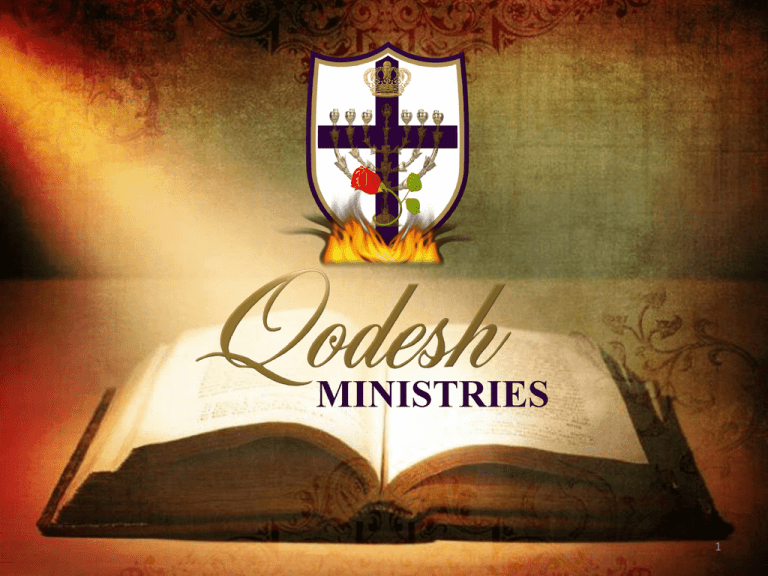
1 THE MESSIANIC PROPHECY BIBLE PROJECT http://www.messianicbible.com HEAR O ISRAEL www.hearoisrael.org SHEEPFOLD GLEANINGS WRITTEN BY JULIE PARKER www.sheepfoldgleanings.com MESSIANIC ISRAEL ALLIANCE http://www.messianicisrael.com AZAMRA TORAH FOR OUR TIME – RABBI AVRAHAM GREENBAUM http://www.azamra.org 2 TORAH: Genesis 23:1-25:18 HAFTORAH: 1 Kings 1:1-31 B’RIT CHADASHAH: Matthew 1:1–17, 2 Timothy 2:15, Hebrews 11:11-16 All references: The Scripture 1998+ unless otherwise noted 3 You did not choose me, I chose you; and I have commissioned you to go and bear fruit, fruit that will last; so that whatever you ask from the Father in my name he may give you. (John 15:16 CJB) Chayei Sarah, which means the "life of Sarah", curiously begins with her death, burial, and Abraham's mourning. The Torah section then concludes with Abraham's death. Yes, indeed! I tell you that unless a grain of wheat that falls to the ground dies, it stays just a grain; but if it dies, it produces a big harvest. (John 12:24 CJB) The Messiah here references His death and resurrection, and the everlasting, glorious fruit of salvation and restoration that would bless many people as a result of His Atonement. We find the principle of greater life continuing after death demonstrated in the account of Sarah. I will bless her; moreover, … she will be a mother of nations; kings of peoples will come from her.“ (Genesis4 17:16 CJB) Sarah lived to be 127 years old; these were the years of Sarah's life. Sarah died in Kiryat-Arba, also known as Hevron, in the land of Kena`an; and Avraham came to mourn Sarah and weep for her. (Genesis 23:1-2 CJB) When she died she was 127 years old; Isaac was thirty-seven at the time. She is the only woman whose age is mentioned in Scripture. One rabbinic writer said her age revealed that Sarah had the exuberance of a seven year old, the beauty of a twentyyear old, and the wisdom of an one-hundred year old. Oral tradition: Teaches that, while Avraham didn’t actually kill Yitzaq, when Sarah heard about what had happened, she hurried from their home in Be’er Sheva toward Mt. Moriyah, which was in Shalem (Jerusalem), and made it as far as Qiryath Arba, which is Hebron, where she died. 127 is the numeric value of the letters in a phrase from last week’s Torah portion in Genesis 22:13, which states; “v‟ya ale5 hoo” or “and he offered him up”. Some translations, like the ISR Scriptures, simply state the number of years that Sarah lived. But, the Torah is very particular and rather wordy in the opening verse. Verse 1 tells us; And Sarah‟s lifetime was one hundred years, twenty years, and seven years; these were the years of Sarah‟s life. What is Torah telling us here? Rabbi Jonathon Sacks explains, in his study on the “Life of Sarah” this week, how Torah is praising Sarah‟s perfection in its repetition. He states, “This is why the Midrash explains that Sarah was, at 100, like she was at 20. After it has cited Psalms 37:18, ‘God knows the days of the perfect’, the Midrash added, ‘just as they are perfect so their years are perfect.’ Only by perfection of a life comes that state of changelessness which characterized Sarah. And the repetition of the word ‘years’ in the Sidra tells us that each total (100, 20 and 7) is compared to the others: At 100 Sarah was as far from the possibility of sin as she was at 20 or at 7. In other words, she had attained the highest of the three degrees of integrity.” 6 Legend of the Jews: Abraham did not pray, but spent his time in mourning and weeping over Sarah. And, indeed, he had great reason to mourn his loss, for even in her old age Sarah had retained the beauty of her youth and the innocence of her childhood. The word Sarai, means “my princess,” implying that she owed her greatness to her status as Abraham’s wife. Henceforth she would be called only Sarah, which signifies that she is a “princess to all the nations of the world.” Prior to the covenant, Sarai’s personal majesty made her the princess of Abraham (and his country Aram). Now, however, all limitations were removed. She was princess “par excellence”—to all mankind (ArtScroll Stone Edition Chumash, p. 75). By belief also, Sarah herself was enabled to conceive seed, and she bore a child when she was past the normal age, because she deemed Him trustworthy who had promised. (Hebrews 11:11 7 The Scriptures 1998+) ..Aḇraham came to mourn for Sarah and to weep for her. To weep for her: The Hebrew phrase here is “v‟ la vak chah” which is spelled “vav-lamed veit-kaf chet-hey”. Now, the “kaf” in the middle of the phrase was written half size in the Torah Scroll. Why? Due to the stringent requirements in the copying of Torah in particular (and Scripture in general), Judah believes that Moshe wrote it this way. Now, the rabbis have a couple of opinions why this is so. 1. One opinion is that Abraham purposely restrained himself from weeping and mourning too excess. 2. Second opinion, that since the letter “kaf” is the “palm of the hand” or “covering” and that a wife is her husband’s spiritual covering; when Sarah died, Avraham’s spiritual covering diminished significantly. And, that’s one possible reason why, within a year, he would marry again. 8 Then he got up from his dead one and said to the sons of Het, "I am a foreigner living as an alien with you; let me have a burial site with you, so that I can bury my dead wife." .. ask `Efron the son of Tzochar to give me the cave of Makhpelah, which he owns, the one at the end of his field. He should sell it to me in your presence at its full value; … Avraham got the point of what `Efron had said, so he weighed out for `Efron the amount of money he had specified in the presence of the sons of Het, 400 silver shekels of the weight accepted among merchants [ten pounds]. … (Genesis 23:3-20 CJB) Abraham paid a full and even inflated price for the cave of Machpelah without balking. The cave that Avraham wants is called “Machpelah” which means “to double” or “a double portion”. This cave is actually a “double cave” or two caves in one. There is one on top of another. That is how it got its name, literally the “cave of two”.. 9 He had long known the peculiar value of this spot. Adam had chosen it as a burial-place for himself. He had feared his body might be used for idolatrous purposes after his death; he therefore designated the Cave of Machpelah as the place of his burial, and in the depths his corpse was laid, so that none might find it. When he interred Eve there, he wanted to dig deeper, because he scented the sweet fragrance of Paradise, near the entrance to which it lay, but a heavenly voice called to him, Enough! Adam himself was buried there by Seth, and until the time of Abraham the place was guarded by angels, who kept a fire burning near it perpetually, so that none dared approach it and bury his dead therein. Now, it happened on the day when Abraham received the angels in his house, and he wanted to slaughter an ox for their entertainment, that the ox ran away, and in his pursuit of him Abraham entered the Cave of Machpelah. 10 In her death, Sarah influences the history of the Land and people Yisra’el. Avraham had already been promised Eretz Yisra’el; but, that promise had yet to be realized. It was through the purchase of the Cave of Machpelah, for Sarah’s burial, that a part of Eretz Yisra’el first became an eternal heritage for the Hebrew people in the eyes of the nations. For the first time, the spiritual nature of the Holy Land was given actual expression. 400 is the numeric value of the letter “tav” which represents “sign of the covenant”. It also equals the number of years from the birth Yitzaq to the Exodus from Mitzrayim (Egypt) that YHVH speaks to Avraham about in Genesis 15:13; And He said to Avram, “Know for certain that your seed are to be sojourners in a land that is not theirs, and shall serve them, and they shall afflict them four hundred years. Stephanos (Stephen) recaps this also in Acts 7. 400 also equals the numeric value of the letters in “Ephron”, whom Avraham buys the field and cave from. 400 also equals “sh‟na-eem” which is “two”, as in the “two caves”, “l‟mashal” or “for a proverb” and “m‟seferah” or “from the book”. 11 The Cave of Machpelah is the world's most ancient Jewish site and the second holiest place for the Jewish people, after Temple Mount in Jerusalem. Abraham, Isaac, Jacob, Sarah, Rebecca, and Leah are all later buried in the same Cave of Machpelah. These are considered the patriarchs and matriarchs of the Jewish people. The only one who is missing is Rachel, who was buried near Bethlehem where she died in childbirth. The double cave, a mystery of thousands of years, was uncovered several years ago beneath the massive building, revealing artifacts from the Early Israelite Period (some 30 centuries ago). The structure was built during the Second Temple Period (about two thousand years ago) by Herod, King of Judea, providing a place for gatherings and Jewish prayers at the graves of the Patriarchs. This uniquely impressive building is the only one that stands intact and still fulfills its original function after thousands of years. The structure is divided into three rooms: Ohel Avraham, Ohel Yitzhak, and Ohel Ya'akov. Presently Jews have no access to Ohel Yitzhak, the largest room, with the exception of 10 days a year. 12 City of Arba, or the “City of Four”, as “arba” is the Hebrew word for four, when counting. The city was named after Arba the giant, who was the father of Anaq (of the Anaqim). Perhaps Arba was “four” times bigger than everyone else. The City of Arba, is also known as Hebron. And, Hebron means “conjunction” or “joining”. It’s here that we see “four conjunctions”. Summary: Sarah dies in the “City of Four” or perhaps better phrased, “The City of Four Couples”. Avraham buys a “two story” or “double” cave, as a burial place for his family. He buys this cave from the “Hittites” or “sons of fear” or “those who fear”, along with the field of Mamre (“fatness” or “blessing”) and all the terebinth trees (“mighty men”). This is the spot where Avraham circumcised himself, met with YHVH and two witnesses and was told of Yitsaq’s impending birth. He knew this spot and this double cave. And, this cave contains the remains of Adam & Chawah, Avraham & Sarah, Yitzaq & Rivka and Ya’aqob & Leah the fathers and mothers of kol Yisra’el; along with the father and mother of all mankind. 13 There are numerous written accounts over the decades that state there are indeed three pair of remains on biers in the cave above and one pair in the cave below. If you add up the number of Hebrew letters in the names of the patriarchs; Avraham (5), Yitzaq (4) and Ya’aqob (4) you get 13. If you count the number of Hebrew letters in the names of the matriarchs; Sarah (3), Rivka (4), Leah (3) and Rahel (3) you get 13 also. Thirteen is also the numeric value of the word “echad” or “unity” or “as one” and “Avi” or “Abi” which is “my Father”. If you add the total number of letters in both the patriarchs’ and matriarchs’ names, you get 26 which is the numeric value of “Yud-Hey-Vav-Hey” or YHVH. After Elohim took Chawah from Adam’s side, we read in Genesis 2:24, as YHVH joins them as husband and wife, He pronounced them “Echad,” that is “one” or a “unity.” For this cause a man shall leave his father and mother and cleave to his wife, and they shall become one (Echad) flesh.‟” Is this “Echad” or “unity” another clue to the Cave of Machpelah, in the “City of the Four Couples”? 14 By now Avraham was old, advanced in years; and Adonai had blessed Avraham in everything. (Genesis 24:1 CJB) The sentence reads in Hebrew; “V‟Avraham va-eekah, ba-eh bayamim”. It literally translates as; “And Avraham was old, he came into the days.” This is a Hebrew idiom meaning that he (they) lived each day to the fullest. They were present, in the now, fulfilling their purpose in each day they lived. Legends of the Jews: So long as she was alive, he felt himself young and vigorous, but after she had passed away, old age suddenly overtook him. It was he himself who made the plea that age be betrayed by suitable signs and tokens. Before the time of Abraham an old man was not distinguishable externally from a young man, and as Isaac was the image of his father, it happened frequently that father and son were mistaken for each other, and a request meant for the one was preferred to the other. Abraham prayed therefore that old age might have marks to distinguish it from youth, and God granted his petition, and since the time of Abraham the appearance of men changes in 15 old age. Known as the one of seven great wonders. Avraham said to the servant who had served him the longest, who was in charge of all he owned, "Put your hand under my thigh; because I want you to swear by Adonai, God of heaven and God of the earth, that you will not choose a wife for my son from among the women of the Kena`ani, among whom I am living; but that you will go to my homeland, to my kinsmen, to choose a wife for my son Yitz'chak." The servant replied, "Suppose the woman isn't willing to follow me to this land. Must I then bring your son back to the land from which you came?" Avraham said to him, "See to it that you don't bring my son back there. Adonai, the God of heaven — who took me away from my father's house and away from the land I was born in, who spoke to me and swore to me, 'I will give this land to your descendants' — he will send his angel ahead of you; and you are to bring a wife for my son from there. But if the woman is unwilling to follow you, then you are released from your obligation under my oath. Just don't bring my son back there." The servant put his hand under the thigh of Avraham his master and swore to him 16 concerning the matter. (Genesis 24:2-9 CJB) It was the father’s duty to provide the bride for his son. Isaac was thirty-seven years old when his mother died and had waited upon his father to see when a bride would appear. Notice Isaac did not take charge of his own life by going about seeking his own bride. It was the responsibility of the father. You did not choose Me, but I chose you (John 15:16). Abraham chose his eldest servant for this very delicate job of finding a bride for Isaac. Even though the servant’s name was not mentioned in this whole story, it has always been understood the servant was Eliezer (Genesis 15:2). As was the custom when swearing an oath, the servant placed his hand under Abraham’s thigh, thus validating his oath to him. The thigh represented the seed of that person. If an oath were broken or violated, then the issued children from that seed would avenge the act of disloyalty (Genesis 24:2-9). Because YHVH had led Abraham out of the spiritual filth of Babylon he no 17 way wanted Isaac to go back to what he had left behind. Now why would Abraham insist on a wife for Isaac from the same idolatrous culture that he had once been commanded to abandon? Surely there were many faithful and available converts in his camp, which had grown to at least several hundred. Bereshith 9:25-27 Then he said: "Cursed be Canaan; A servant of servants he shall be to his brethren.“ And he said: "Blessed be YHVH , The Elohim of Shem, And may Canaan be his servant. May Elohim enlarge Japheth, And may he dwell in the tents of Shem; And may Canaan be his servant." The curse of Canaan passes down to all generations. This is the reason why Abraham was not willing to consider a Canaanite wife for his son. Long before this, it was Sarah who had understood that Ishmael could not qualify as the seed of promise because he was born of a descendant of Ham (Hagar). Later that son had to be cast out for he did not carry the seed of promise. For Abraham, staying away from the Canaanites and creating a line of descendants that was pure, was the key to inheriting the land. 18 Bereshith 24:6 But Abraham said to him, "Beware that you do not take my son back there. Why, if Isaac is to have a woman from his father’s family, cannot this grown man just go back and choose his own wife? Isaac had already been offered as a special kind of sacrifice – an olah, which is an “ascending offering”; it can also be interpreted as a “stairway”. This word is related to making aliyah, which expresses immigrating to Israel. Going to Jerusalem is always described as “going up”. To leave is “to descend”, or to yarad. Abraham was adamant that his ascending offering (Isaac) would not be seen as “going down” by leaving the land. 19 Then the servant took ten of his master's camels and all kinds of gifts from his master, got up and went to Aram-Naharayim, to Nachor's city. (Genesis 24:10 CJB) Eliezer took ten of his master’s camels with him. It is the number of Divine order; as in the Ten Commandments, the Ten generations from Adam to Noach and ten more from Noach to Avraham. Most significant is the idea of Eliezer being a picture of the Ruach HaKodesh. (1) Who has quickened and guided the Zionist movement and the restoration of the Jews to the land of Israel, and (2) Who the Father has sent to gather from the nations, restore, equip, and return to the Father's house, the Bride of Messiah Yeshua. The Spirit is currently restoring many believers, who are in covenant with YHVH through faith in the blood of Messiah, to the knowledge of their faith's Hebraic origins, their Israelite identity and responsibilities, and their heritage of the Spirit and Torah of YHVH. 20 The ten camels represent the ten tribes, the “Lost Sheep of the House of Yisra‟el”. The Ancient Servant brought gifts, one camel load for each of the ten tribes. We’re also told from the Hebrew that the servant brought “all the riches of his master in his hand”. .."Worthy is the slaughtered Lamb to receive power, riches, wisdom, strength, honor, glory and praise!“ (Revelation 5:12 CJB) Now, how could he take all of Avraham’s riches with him? Avraham was probably one of the richest men of his day. Eliezer could not have taken everything with him. The rabbis teach that he brought Avraham’s “will” with him bequeathing everything to Yitzaq as sole heir, to show that Yitzaq would inherit all. Isn’t that’s how it is with us? We have the written declaration, The Scriptures, declaring that Yahshua, the Bridegroom, has indeed inherited all of His Father’s riches and Kingdom and those gifts were given to us also. This is why it says, "After he went up into the heights, he led captivity captive and he gave gifts to mankind.“ (Ephesians 4:8 CJB) 21 Aram Naharayim means “Aram of the two rivers”. Aram means “elevated” or “exalted”. It is the ancient name for Aramea which was mostly Syria and Iraq. The “two rivers” refers to the Euphrates and the Tigris. Paddan Aram is referred to a lot. This is the same area. Paddan means “Plain”, as in the “Plain of Aramea”. Nahor was Avraham’s brother. His name means “snorting” or “breathing hard”. Legends of the Jews: Attended by ten men, mounted upon ten camels laden with jewels and trinkets, Eliezer betook himself to Haran under the convoy of two angels, the one appointed to keep guard over Eliezer, the other over Rebekah.The journey to Haran took but a few hours, at evening of the same day he reached there, because the earth hastened to meet him in a wonderful way. 22 He said, "Adonai, God of my master Avraham, please let me succeed today; and show your grace to my master Avraham. Here I am, standing by the spring, as the daughters of the townsfolk come out to draw water. I will say to one of the girls, 'Please lower your jug, so that I can drink.' If she answers, 'Yes, drink; and I will water your camels as well,' then let her be the one you intend for your servant Yitz'chak. This is how I will know that you have shown grace to my master.“ (Genesis 24:12-14 CJB) Eliezer was likewise a man of faith. Abraham had taught him well, just like a son. Now, as the servant prayed, he asked YHVH to reveal Yitzaq’s bride. And, he devised a test that would show the young lady’s attitude toward service. This would tell him if she would be a suitable match for the master’s son. 23 Before he had finished speaking, Rivkah the daughter of B'tu'el son of Milkah the wife of Nachor Avraham's brother, came out with her jug on her shoulder. The girl was very beautiful, a virgin, never having had sexual relations with any man. She went down to the spring, filled her jug and came up. The servant ran to meet her and said, "Please give me a sip of water from your jug to drink." "Drink, my lord," she replied, and immediately lowered her jug onto her arm and let him drink. When she was through letting him drink, she said, "I will also draw water for your camels until they have drunk their fill." She quickly emptied her jug into the trough, then ran again to the well to draw water, and kept on drawing water for all his camels. (Genesis 24:15-20 CJB) Then, after she drew and served the servant, she drew water and served the Ten camels (ten tribes). She passes the test. In fact, like Avraham, she runs to serve and reveals herself to Abraham’s servant by her diligence and willingness to ‘go the extra mile.’ 24 When the camels were done drinking, the man took a gold nosering weighing one-fifth of an ounce and two gold bracelets weighing four ounces .. (Genesis 24:22 CJB) It is here that the Ancient Servant gives the Bride the first of the gifts from her Husband: 1. A nose ring symbolizes being a servant. Gold represents YHVH’s love for us and a half-sheqel is the price of the atonement of a soul (nefesh). 2. Two golden bracelets weighing ten shekels. Like handcuffs, these bracelets show that the work of her hands would be in service to her Husband. As ten represents divine order; and also here that she and her children would accept the Ten Commandments. He gives her these even before he finds out who she is. If it turns out that she isn’t the seed of Avraham, then she can still represent the Bride because of her heart’s desire to serve, even 25 as Avraham, the father served. "Whose daughter are you? .." She answered, "I am the daughter of B'tu'el the son Milkah bore to Nachor," adding, "We have plenty of straw and fodder, and room for staying overnight." The man bowed his head and prostrated himself before Adonai. (Genesis 24:23-26 CJB) Straw is teben (Strongs # 1129/ TWOT 2493 from TWOT 255), Hebrew for: to build, rebuild, establish, pattern and build up as in construction. The idiomatic meaning is to bring about/ increase in offspring. YHVH is the builder. Through Rebekah’s offspring would come the whole House of Israel. Fodder is mispo (Strongs # 4554) from the Hebrew root meaning feed for animals. Animals in the Bible often symbolize people. In her father’s house were straw and feed, representing how in YHVH’s House there is feed for His people. The feed is the teaching and instruction of YHVH. This food (His Word) nurtures us when we walk in His ways, and is to be the pattern for our life 26 (Ezekiel 43:10-12; 44:23-24). The girl ran off and told her mother's household what had happened. Rivkah had a brother named Lavan. When he saw the nose-ring, and the bracelets on his sister's wrists besides, and when he heard his sister Rivkah's report of what the man had said to her, he ran out to the spring and found the man standing there by the camels. "Come on in," he said, "you whom Adonai has blessed! Why are you standing outside when I have made room in the house and prepared a place for the camels?“ (Genesis 24:28-31 CJB) We do not hear from Rivka’s father, Bethu’el (dweller with El) through most of this discourse. Laban, at the sight of gold and hearing there were ten camel loads of “stuff” outside just usurped his father’s lead in this “bargaining”. Laban means “white”. Now before we equate this with purity, let me remind you that we’ll be reading a lot more about Laban in future parashot regarding Ya’aqob. We’ll see that Laban is anything but pure. Yahshua’s remarks to the Pharisees shows the character, “white-washed sepulchers”, meaning that they appeared white and pure on the outside, but were filled with corruption inside. 27 But when a meal was set before him, he said, "I won't eat until I say what I have to say." Lavan said, "Speak." ... "So now if you people intend to show grace and truth to my master, tell me. But if not, tell me, so that I can turn elsewhere." Lavan and B'tu'el replied, "Since this comes from Adonai, we can't say anything to you either bad or good. Rivkah is here in front of you; take her and go. Let her be your master's son's wife, as Adonai has said." When Avraham's servant heard what they said, he prostrated himself on the ground to Adonai. Then the servant brought out silver and gold jewelry, together with clothing, and gave them to Rivkah. He also gave valuable gifts to her brother and mother. (Genesis 24:33-53 CJB) Eliezer was faithful to his master Abraham and shared the mission first, before looking after his own needs. Rebekah’s father and brother confirmed that she could go with Eliezer to be a wife to Isaac as YHVH had directed. The “servant” now gives Rebekah her “bridal” ornaments and garments. In her obedience, she indeed becomes the Bride. Also of note, is that the “servant” does also give gifts to the family, , they’re near the bride. But, they’re not the bride. Many talk the talk; but, don’t walk it out. They seek the gifts, but not the giver.28 Many believers are fooled into thinking that they are acceptable just because they have been given gifts of the Spirit. But carefully note that while all receive gifts, it is ONLY the BRIDE that receives the garments: And the servant brought out ornaments of silver, and ornaments of gold, and garments, and gave them to Riḇqah. He also gave costly gifts to her brother and to her mother. (Genesis 24:53 The Scriptures 1998+) These “garments” show up again in the book of Revelation where it defines its symbolism: “He who overcomes shall be dressed in white robes, and I shall by no means blot out his name from the Book of Life, but I shall confess his name before My Father and before His messengers. (Revelation 3:5 The Scriptures 1998+) And to her it was given to be dressed in fine linen, clean and bright, for the fine linen is the righteousnesses of the set-apart 29 ones. (Revelation 19:8 The Scriptures 1998+) He and his men then ate and drank and stayed the night. In the morning they got up; and he said, "Send me off to my master." Her brother and mother said, "Let the girl stay with us a few days, at least ten. After that, she will go." He answered them, "Don't delay me, since Adonai has made my trip successful, but let me go back to my master." They said, "We will call the girl and see what she says." They called Rivkah and asked her, "Will you go with this man?" and she replied, "I will.“ (Genesis 24:54-58 CJB) Laban and their mother try to talk Eliezer into staying for ten days, so that they can say their goodbyes. This sounds reasonable in one respect, until we remember how Laban got Ya’aqob to stay for 22 years. The number ten means “Divine order” but among others, “za‟ahv” or “wolf” and “gez” or “shorn fleece”. It sounds like Laban’s intent here might have been to act the “wolf” and “fleece” Eliezer. But Rebecca demonstrated unusual faith. She, like her Uncle Abraham and Aunt Sarah before her, was willing to leave the comforts and security of Babylon and to go with a stranger to a strange place and to live as a 30 nomad. They blessed Rivkah with these words: "Our sister, may you be the mother of millions, and may your descendants possess the cities of those who hate them." (Genesis 24:60 CJB) As Rivkah is about to leave her family to start a new life as the bride of Yitzaq and mother of Yisra’el, her family blesses her; that she would become the mother of millions. Today this prayer is still prayed on the eve of Sabbath/Erev Shabbat over the daughters as a blessing. If you count the zeros, you end up with over a billion people. They also pray that her seed would possess the gates of their enemies. As the research of Yair Davidy, Steve Collins and John Hulley point out, this has indeed happened: as you look at the sea and land gates to the continents you will see that America and/or England have done this. 31 And Yitsḥaq came from the way of Be’ĕr Laḥai Ro’i, for he dwelt in the South. And Yitsḥaq went out to meditate in the field in the evening. And he lifted his eyes and looked and saw the camels coming. (Genesis 24:62-63 The Scriptures 1998+) Yitzaq was returning from “Be‟er Lahai Ro‟i” or the “well where the Living One saw me”. This is the place where YHVH spoke to Hagar after she fled Sarah’s anger. This is the place where Elohim instructed her to return and submit herself to Sarah. Now, we find that Yitzaq had been there. He could have been seeking answers from YHVH about the loss of his mother. Yitzaq was “in the field” praying. He returned from seeking YHVH. He was in “the” field. Not a field, “the” field, just outside the cave of Machpelah. The Hebrew word here is “su‟ach” which means “supplicating words”. 32 Eliezer knew to bring Rivkah to that very spot. Of course, if Eliezer is a picture of Ruach HaKodesh, he would have known. There’s an interesting little Hebrew word thing going on here. “Su‟ach” or “supplication” is asking and “Ru‟ach” or “Spirit” is bringing the answer. They are spelled the same; except Su’ach starts with a “shin” or “El Shaddai” and “Ru‟ach” instead has a “reish” or the “Head” or “beginning”. This plays out here. Rivkah was brought some 700 miles by camel. Yet, YHVH timed their leaving to the hour, so that they would arrive at “the field” as Yitzaq was making supplication to Elohim. 33 Rivkah too looked up; and when she saw Yitz'chak, …She said to the servant, "Who is this man walking in the field to meet us?" When the servant replied, "It's my master," she took her veil and covered herself. (Genesis 24:64-65 CJB) • Women of the Middle East of that era did NOT veil their faces in the presence of men!, This was a wedding veil. • The tradition of the “Bridal Veil” in use in the Western world came from this ancient custom • Rivka, by veiling her face, let Isaac know that she was the one his father had chosen, and that she consented to be his wife Isaac, the bridegroom, is the one who will remove Rebekah’s veil. Our Bridegroom, Yeshua, removed the veil at the Temple when He died. The veil was torn from top to bottom by the power of the shedding of His blood. Yeshua will be the one who removes the veil that, one might say, has covered the heart of the Bride. This unveiling happens when the bride draws close to the Bridegroom. Hearts that are circumcised at the lifting of the veil will be delivered from all that 34 previously hindered the Bride’s love for her Bridegroom. The servant told Yitz'chak everything he had done. Then Yitz'chak brought her into his mother Sarah's tent and took Rivkah, and she became his wife, and he loved her. Thus was Yitz'chak comforted for the loss of his mother. (Genesis 24:66-67 CJB) The Spirit of YHVH woos her from the Nations and brings her to the Bridegroom, dressed as a Bride in garments ready for her wedding. Isaac found Rebekah worthy to step into the role of Sarah, the matriarch of the family. Isaac invited Rebekah to be his equal by bringing her into the tent of Sarah and marrying her. In doing this, she inherited the blessing YHVH gave to Sarah. “I will bless her so that she will be the mother of nations; kings of peoples will come from her” (Genesis 17:16). In marrying Isaac, Rebekah inherited the honored position of becoming the mother of myriads of descendants. Isaac found great consolation in this and was comfort after his mother’s death. Rebekah became his wife and Isaac loved her. The Bride will be found scattered among the nations. She is one 35 who has crossed over Abraham loved Sarah, and Isaac loved Rebekah. Genesis 24:67 says that Isaac took Rebekah, she became his wife and he loved her. We would expect the opposite. He should have fallen in love with her, married her and then taken her into the tent. The Bible has a more sober (but no less romantic) view of marriage. Isaac did not marry Rebekah because he loved her; he loved Rebekah because he married her. We should love our spouses because they are our spouses. In our culture, we believe that a person should marry whoever he or she falls in love with. This is a bad plan. It is possible to fall in love with the wrong person. It is possible to fall in love with many wrong persons. Falling in love is a terrible criteria upon which to base a marriage. If a man or woman bases his or her marriage merely on love, it is doomed from the start. Feelings are unpredictable. They rise and fall. They come and go. Marriage must not be based upon love. 36 Love must be based upon marriage. She was modest and had a servant’s heart; she was selfless and kind: In their first drink, ten camels would consume 140 gallons of water! That Rebecca would undertake such a strenuous task so eagerly for a total stranger is a supreme indication of her sterling character (ArtScroll Stone Edition Chumash, pp. 111–113). She was a praying woman. She was able to hear the voice of YHVH and believe his Word: (Gen 25:21–22) She was a discerner of character: (Gen 27:1ff) To guard the Word of YHVH that had been given to her earlier that the older son would serve the younger, to insure that the birthright would go to Jacob, and to keep the birthright promises and blessings from going to Esau, a wicked and profane individual who had no interest in perpetuating the Abrahamic Covenant, Rebecca took to scheming. She knew that Esau was not worthy of such a divine mission and destiny. 37 The Patriarchs did not function as individuals; their mission in life required the partnership of a wife worthy to be a Jewish matriarch. This is clear in the relationship of Abraham and Sarah. So, too, only after Isaac married Rebecca did Abraham give him "everything" he had, which included all his blessings. Only now, therefore, when Jacob was going to find his proper match, could Isaac confer upon him the blessing of Abraham (ArtScroll Stone Edition Chumash, p. 143, comment on Gen 28:1–5). 38 “Servant”, “master”, and “man” are three titles of Eleazar in our parasha. Of course we know that these are three titles for the Messiah in the Gospels, but who do you suppose is also referred to by these three titles in our parasha? It is Isaac! Bereshith 24:14 … let her be the one You have appointed for Your servant Isaac. Bereshith 24:65 for she had said to the servant, "Who is this man walking in the field to meet us?" The servant said, "It is my master." So she took a veil and covered herself. Isaac does not actually play a role in the selection of his bride. He does not even make a physical appearance in chapter 24 until verse 62. Yet it may surprise you that the mention of Isaac as the father’s “son” occurs 13 times in those first 61 verses of chapter 24. So in addition to being referred to as a servant, a master, and a man, it is very obvious that the Father wants us to know that he is His Son. And the Father’s mission is to find a suitable bride for Him. 39 Then Avraham breathed his last, dying at a ripe old age, an old man full of years; and he was gathered to his people. (Genesis 25:8 CJB) Abraham lived thirty-five more years after Isaac married Rebekah and took another wife, Keturah, who provided him with six more sons. The Midianites are from her offspring. When Abraham died, everything was left to Isaac, as he was his only son, the son of the promise. Abraham gave gifts to all his children but only one, Isaac, received the birthright inheritance. The seed of Isaac retains the Covenant and the birthright. Hagar and Keturah’s children were also blessed and become fathers and princes of many nations (Genesis 25:16; 1 Chronicles 1:32). Abraham’s whole family was with him at his death, including Ishmael. Abraham was buried with his wife Sarah in the cave of Machpelah near Mamre, in the field of Ephron the Hittite (near Hebron), the field that Abraham had bought. 40
